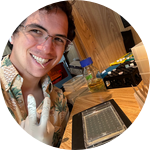Plant Biology Exploratory Research Microgrant
This Plant Biology Exploratory Research Microgrant program seeks to empower those who wish to live in a world where plant biological research, naturalism, and education become an exciting aspect of personhood, where the tools and materials necessary to conduct meaningful research are globally accessible, such that anyone and everyone can participate meaningfully in the exploration of our living world. This is an international grant open to global applicants.
Submitted Projects
11
Total Funding
$50,000
Submission Deadline
Jan 10, 2025
About This Grant
Plants, and those who sip starlight, have given us the air we breathe, the food we eat, and the homes we live in. Despite their utmost importance throughout human history, modern curricula and access to exploratory tools for plant research have not fully actualized their potential, especially in regions of the world not considered impactful enough to warrant significant funding for such efforts. We're interested in supporting a wide range of projects, from understanding how plants respond to environmental stress to exploring innovative cultivation techniques, plant bioengineering projects that teach the processes through engaging and thought-provoking hands-on labs, genetic studies diving into understudied species that have meaningful (agri)cultural value, or even novel uses of plants in technology, medicine, or ethnobotanical explorations. Our ideal candidates for this grant are people that are extremely passionate about making an impact in the craft and education of plant biology, regardless of their academic status or educational background. Good science happens everywhere, and we want to reach those with vision who would benefit greatly from a small dose of funding.
We encourage proposals that:
- Drastically reduce the barrier to entry for one or more aspects of plant biological research through the design and construction of open-source tools, with a focus on globally accessible materials and methods - minimizing costs while maximizing impact.
- Directly increase access to open-source, high-quality educational materials for students, particularly in the “global south,” to inspire and empower the next generation of plant biologists in a meaningful and materially impactful way.
- Present a unique research question or approach within plant biology and/or biotechnology that may lead to societal benefit or cultural preservation of botanical heritage.
- Act in service of an underserved demographic or educationally disenfranchised community, where plant biology and/or biotech would be used to educate and enrich the lives of those participating in a materially impactful way.
- Demonstrate clear potential for scientific advancement or practical application with a focus on openness and transparency.
- Can benefit from quick, catalytic funding to get started or to achieve a specific research milestone.
These are just a few examples that fit our expectations, but we are also very much interested in being surprised and inspired by the courage and foresight of a topic outside of what was mentioned above. Think deeply and sincerely.
Applications from academic researchers, independent scientists, citizen scientists, amateur biologists, and small research teams are all welcome. We particularly encourage cross-disciplinary projects that bring new perspectives to plant biology, its methods, and its education.
Grant Officers
How It Works
ROLLING SUBMISSIONS: The goal of this small, fast grant program is to get these projects off the ground quickly. If selected, the grant (up to $10,000 with the average Science Angel grant being $4,000) towards an ongoing or new Experiment.com project. Project leads are encouraged to try to raise additional support from the crowdfunding process, as granted amounts may only cover part of the project funds. The sooner you fill out a project application the better (use the "start a project" link below). In addition to funding, we hope to stay engaged with the projects as mentors and supporters, helping to make the experiments a success. This grant program is open to non-profits and individuals, and is not able to support for-profit companies or activities.
We have extended the submission deadline to January 10, 2025!
Funded Projects
8
Developing Carnivorous Pitcher Plants (Sarracenia) as a Model Organism for Education and Research
Sarracenia, a genus of North American, carnivorous pitcher plants, have garnered significant interest...
Developing an Affordable Plant Research Platform using the Farmbot (automated farming robot)
Phlox is highly susceptible to powdery mildew, impacting plant health and increasing fungicide use. While...
Hormonal Regulation and Bacterial Nodulation Efficiency in Tissue Cultured Plants
Plant models offer an overlooked yet powerful framework for teaching biotechnology and STEM skills. This...
Empowering high school students in genome sequencing and bioinformatics
This project transforms HS science education by integrating real-time DNA barcoding and bioinformatics into...
Does Varying the Amount of Oxygen in an Environment Where Bioluminescent Algae Exists Vary the Amount of Light?
Our goal is to create the foundation for a sustainable source of light. We found species of bio-luminescent...
Exploring African biodiversity with an open-source educational program in Plant Synthetic Biology
Much of Africa's plants have not been studied. As a non-profit, SynBio4ALL aims to study plant biodiversity...
Zap-pore: DIY Electroporation for Global Biotech Accessibility and for plant genetic engineering
Zap-pore is a low-cost (10$), open-source DIY tool for electroporation, using everyday tools and common...
Copper gene-switch for controllable gene expression in plants
Chemical-induced promoters or "Gene Switches" allow expressing a gene of interest in a controllable manner...
Submitted Projects
3
Lyophilized Agrobacterium with pCambia2300-RUBYGREEN
I want to lyophilize Agrobacterium with pCambia2300-RUBYGREEN for easy distribution. Many people are interested...
Soil Amendment in Kenya on Medium and Small Scale Farming Using Bio-Fertilizer Obtained from Cowpea and Peanut Nodules.
This research aims to provide affordable and environment friendly fertilizer to farmers for rational decision...
Creating an open-source supervisory control and data acquisition software for automating bio-processes.
I aim to democratize bioreactor systems by creating a lightweight, open-source SCADA (supervisory control...













 Experiment Grant Programs
Experiment Grant Programs